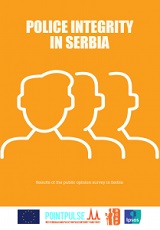POLICE INTEGRITY IN SERBIA - Results of the public opinion survey in Serbia 2015
POLICE INTEGRITY IN SERBIA - Results of the public opinion survey in Serbia 2015
Author(s): Authors Various
Subject(s): Politics / Political Sciences, Politics, Civil Society, Governance, Security and defense
Published by: BCBP Beogradski centar za bezbednosnu politiku
Keywords: police integrity; Serbia; police sector; corruption
Summary/Abstract: Bad economic situation is the main problem of Serbian citizens. When they are not preoccupied by this difficult, they are concerned with corruption, which is, for the majority of the citizens, a normal occurrence in Serbian society. Citizens say that corruption is everywhere, also inside the police, the institution which issupposed to lead the fight against corruption together with the Prosecutor’s office. Only four percent of the citizens believe that there is no corruption within the police. For more than two thirds of citizens, corruption within the police is widespread. Based on previously conducted public opinion surveys, the police is always amongst top five most corrupted institutions. This is also the case now, and police is accompanied by Health, Customs, Judiciary and Commercial Inspection. Traffic police, border police and the part of the police fighting of economic crime, are considered to be the parts of police where corruption is mostly widespread. The most corrupted within the police are those employed on the high positions, as well as police officers which have daily contact with the citizens. Four percent of the citizens state they have participated in bribery with the police representatives. Even when the socially desirable answers and the fear of admitting such deeds are taken into account, the difference between the perception of corruption and the experience with corruption is great. Citizens believe that the corruption level in Serbia has remained the same in the past year. Besides that, the fight against corruption is personalized, and institutions’ contribution is very small. Every fifth citizen believes that the Serbian Prime Minister contributed the most to fight against corruption. Nevertheless, Serbian citizens do not have a clear idea about to whom they should report corruption, as well as which is the institution in charge for the fight against the corruption within police force. At the end, citizens believe that the civil society and the European Union have their own part in the fight against corruption. Civil society organizations are perceived as direct participants in the fight against corruption, independently or in cooperation with the state, and the European Union primarily through financial support.
Series: BCBP - Assessment of Police Integrity
- Page Count: 36
- Publication Year: 2015
- Language: English
- Introduction
- Content File-PDF

